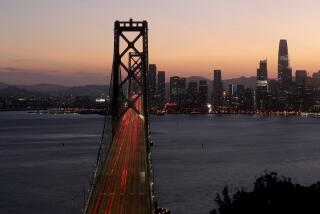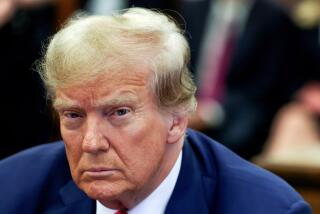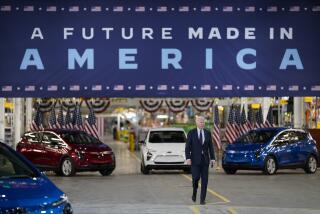Here’s why Arnold Schwarzenegger and Kevin de León are teaming up on climate change
Former Gov. Arnold Schwarzenegger, a Republican, is joining forces with an influential Democrat to tackle one of California’s biggest problems: pollution from cars and trucks.
The transportation sector is California’s largest source of planet-warming greenhouse gas pollution — and emissions are trending up, not down. But Schwarzenegger and Kevin de León, the former state Senate leader who is now running for a Los Angeles City Council seat, see an opportunity to clear the air.
Schwarzenegger and De León are launching an initiative with environmental activists and researchers at USC and UCLA to study how local governments can speed the adoption of cleaner transportation options and to promote more aggressive action at the state level. Reducing dependence on oil for transportation, they say, would benefit the climate and reduce lung-damaging air pollution in disadvantaged communities.
“Pollution kills people. There’s no getting around it,” De León said in an interview, describing the new initiative publicly for the first time. “And it’s been happening for the last century. It’s just been a very slow burn.”
De León, who ran unsuccessfully against incumbent Democrat Dianne Feinstein for a U.S. Senate seat last year, has been a leading advocate for political action on climate change and air pollution. As a state senator, he wrote the bills that raised California’s clean energy mandate to 50% by 2030, then 100% by 2045.
Schwarzenegger is also a climate change policy veteran. As governor, he signed the Global Warming Solutions Act of 2006, which set the first legal requirement for California to slash its greenhouse gas emissions.
The movie star and former governor said he and De León “come from different parties, but we share the belief that we can do better at protecting the people from the health impacts of pollution.”
“I’ve always said there is no Republican air or Democratic air,” Schwarzenegger said in a statement.
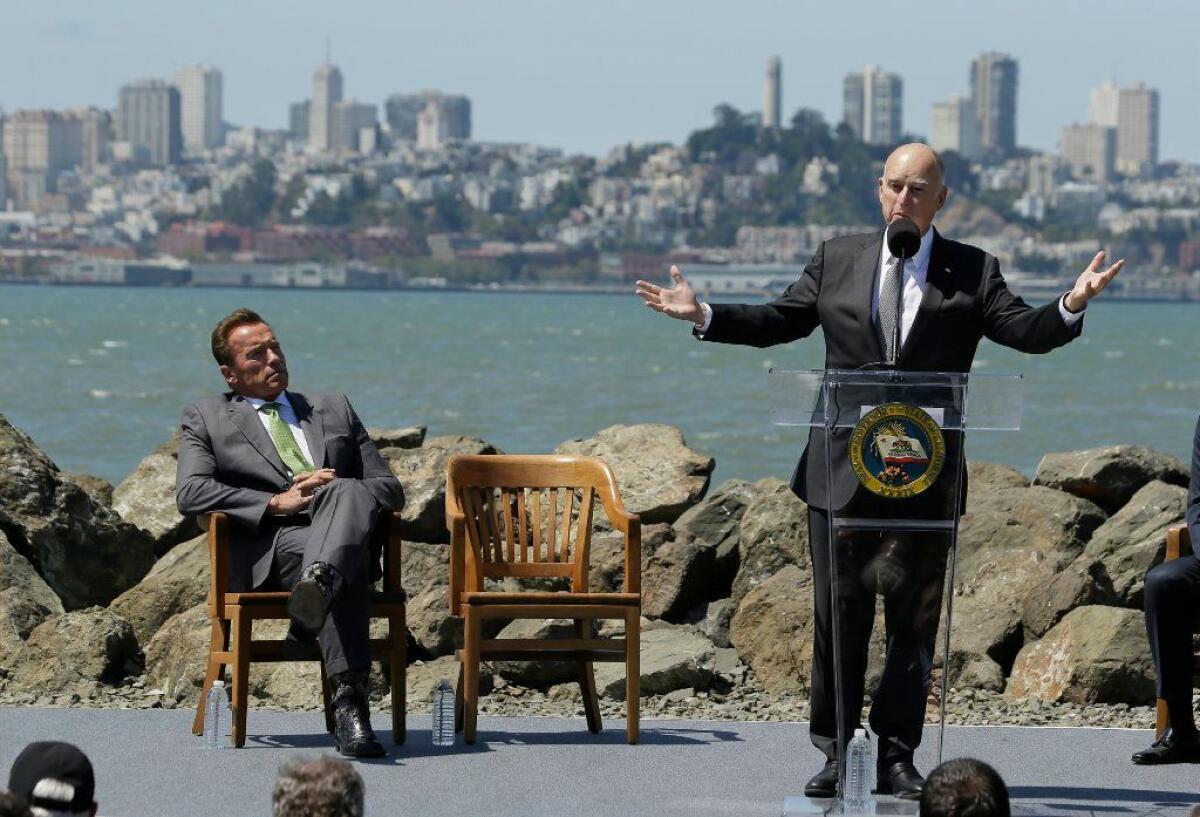
The laws pushed by Schwarzenegger and De León have helped reduce emissions to 429 million metric tons of carbon dioxide equivalent in 2016 from 494 million metric tons in 2004, according to state officials. But most of those reductions have been driven by the electricity sector, as homes and businesses use energy more efficiently and utilities replace coal-fired power plants with solar panels, wind turbines and natural gas.
Transportation was responsible for 41% of California’s climate pollution in 2016. And as the economy has grown in recent years, transportation emissions have risen, fueled by increased driving.
Tailpipe pollution also contributed to the 87 consecutive days Southern California violated federal smog standards last summer, said Antonio Bento, an economist who leads USC’s Center for Sustainability Solutions. Bento, who plans to support Schwarzenegger and De León’s initiative with academic research, said a Trump administration proposal to roll back fuel-efficiency rules would only worsen the region’s air pollution.
“It’s absolutely unbelievable that we’ve made so much progress in terms of air quality. But unless we continue to do a major push for the electrification of the fleet, I think we are starting to plateau,” Bento said.
“Electrification of the fleet” means replacing fossil-fuel-powered cars and trucks with electric vehicles. It’s California’s main strategy for slashing transportation emissions, along with promoting alternatives to driving.
L.A. keeps building near freeways, even though living there makes people sick »
So far, the state’s highest-profile efforts to clean up transportation have had mixed results.
Former Gov. Jerry Brown set a goal of putting 5 million electric vehicles on the road by 2030, but just 550,000 EVs have been sold in the state to date, according to Veloz, a nonprofit backed by environmental groups and car companies. And critics say a market-based program known as cap and trade is too gentle on the oil industry, although state officials have defended the program, arguing it has kept transportation emissions from rising even more.
In 2015, De León tried to get a bill through the Legislature that would have mandated a 50% reduction in petroleum use statewide by 2030. But he was forced to strip that measure from the bill amid opposition from the oil industry.
Now, De León and Schwarzenegger are taking an approach they hope will sidestep those thorny politics: focusing on local governments.
Although the state can subsidize electric vehicles and prod utility companies to install EV chargers, cities and counties are largely responsible for the policies that influence how many miles people drive, through actions such as housing and zoning decisions, investments in public transit and regulation of ride-sharing services. Local governments also buy a huge number of buses, trucks and passenger vehicles.
“What the senator and former governor are trying to do is really look to local and regional leaders for lessons of success to describe what has worked and what hasn’t worked,” said J.R. DeShazo, director of UCLA’s Luskin Center for Innovation, who is also working on the new initiative. “What we would be doing is helping the senator and the governor take these local strategies and think about how do we scale them statewide.”
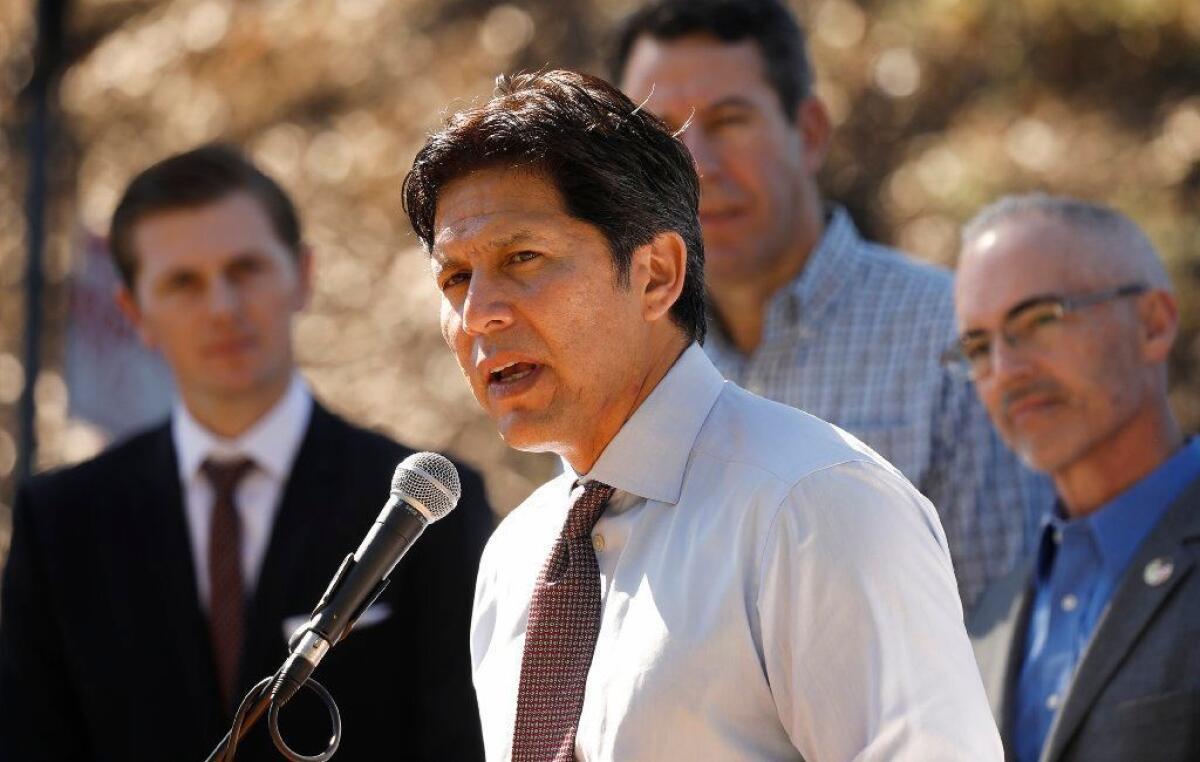
The initiative will also involve researchers at USC, where Schwarzenegger teaches an environmental policy class and chairs an institute named for him. Bento said he and other USC professors plan to conduct research on a variety of topics, possibly including vehicle-buying habits in minority communities, policies that could encourage car dealerships to embrace electric vehicles and the best way to structure incentives for EVs.
“One of the key issues is how do we design public policies so that not only do we promote a cleaner environment, but we also do it in a way that reduces inequalities and brings these technologies to vulnerable communities,” Bento said. “It’s not just subsidizing the purchase, it’s thinking about the entire infrastructure that is needed to allow you to even consider this technology in the first place,” including the availability of charging stations.
From De León’s perspective, reducing emissions needs to be done in a way that helps low-income and minority communities breathe easier. He pointed to his former state Senate district in central and eastern Los Angeles, which he said is crisscrossed by seven freeways.
“Too many kids are sick at home missing school because of dangerous levels of air pollution,” De León said.
Cleaner air is linked to stronger lungs in Southern California children »
Cleaning up the transportation sector won’t be easy, especially in Southern California, which has long been defined by freeways and suburban sprawl. The state’s long-term plan for reducing climate pollution envisions a 15% reduction in miles traveled by light-duty vehicles by 2050, which the state plan says will require strategies such as more infill development, congestion pricing and expanded roles for transit, biking and walking.
The state’s ability to cut emissions will also hinge on the private sector, such as battery manufacturers, automakers and ride-share companies. The biggest player in the electric vehicle market is Elon Musk’s Tesla Inc., which said last week it would finally start selling its Model 3 sedan at the long-promised $35,000 price point.
Bento said he’s excited to work with Schwarzenegger.
“Coming from Portugal, as a kid my idea of him was the Hummer driver in ‘The Terminator,’” Bento said. “It’s been a phenomenal surprise and inspiration to me how much he’s taken this as a big cause of his life now.”
